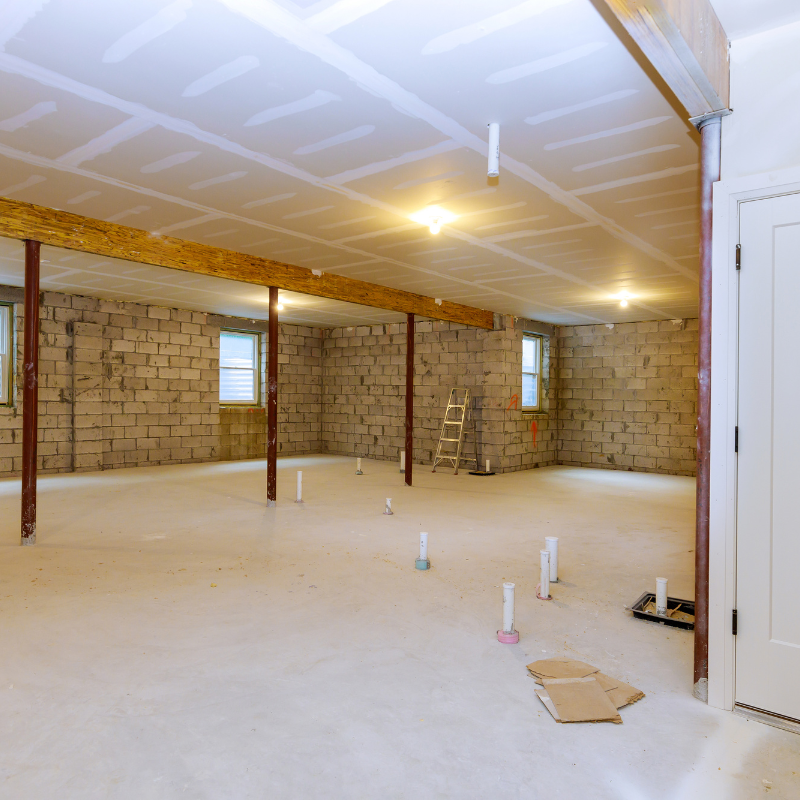
Basement Foundation Repair in Baltimore and Surrounding Areas
Most homeowners consider their basements in terms of just another room in their house. But a basement also functions as a home’s foundation. Basement foundations are partly or entirely below ground level, consisting of a cement bottom and walls from seven to ten feet high to allow for future build-out.
Although there are several reasons a Baltimore homeowner would opt for a basement foundation, the main one has to do with the versatility of this solution. Namely, a basement foundation allows the owner to expand their living space. Typically, a basement mirrors the square footage directly above it and gives homeowners additional square footage without expanding the home’s footprint or going up additional stories above-ground.
The only problem associated with basement foundations is their design. They’re mostly or entirely underground and prone to moisture issues. For this reason, the owner should look for the most common signs their foundation needs fixing.
Signs the Basement Foundation Needs Repair
Wall gaps: One of the easiest ways to tell if a basement foundation needs repair is to check house walls. If there’s a gap between them and built-in cabinetry, they might be separating due to moisture from the foundation. It’s a significant problem that needs immediate attention from a reputable building company
Drywall cracks: Drywall cracks develop for many reasons, but happen most often from the foundation settling or moisture. In cases of moisture damage, it can be challenging to determine from where the water is coming. It could be emerging from the basement foundation if it’s not from the roof or bathroom.
Critters in the house: Centipedes, termites, and other insects can swarm a Baltimore property if it has humidity problems. Excessive moisture from the basement spreads throughout the house, making the home a breeding ground for vermin. They can gnaw on furniture and support beams, leading to even more structural weaknesses.
Sagging floors: Not even the sturdiest wooden floor joist can withstand moisture. Left unattended, it weakens the wood and leads to mold and rot. As a result, the floor sags, which can point to basement foundation problems.
Settling and door gaps: After building is completed, foundations may settle and can drop from a few millimeters to more than five or six inches. The evidence can manifest in different ways. For instance, a gap between the upper part of the front door and the above wall could indicate foundation issues.
Our Reviews
Causes of Basement Foundation Failure
Flooding:
The number one cause of basement foundation failure is flooding. Although weather can certainly lead to flooding, in most cases, it results from a broken water line that allows water to spread throughout the basement. Repeated flooding can weaken the structural elements of the foundation, requiring large-scale repairs.
Poor drainage:
If the property doesn’t have an adequate drainage system, its basement foundation can become one of the first casualties. Improper drainage typically causes soil erosion, leaving gaps in the ground and destabilizing the foundation. In turn, the foundation floor may collapse.
Sinkholes:
If a house is built on limestone or other porous rocks, sinkholes are a risk. The reason is simple—moisture caused by excessive irrigation or heavy rain eats away at the rocks, leaving the ground above without support. Like erosion, collapsing soil can wreak havoc on basement foundations.
Soil shifts:
There’s no way to tame natural processes like soil shifts. In dry periods, the ground shrinks and reduces a foundation’s stability. On rainy days, it can accumulate moisture and swell significantly. The change can be so severe that it causes the basement foundation to crack.
Bad construction:
Some basement foundation problems can be attributed to nature, but man-made mistakes are also prevalent. If the contractor doesn’t build the foundation to complement the local soil and land, foundation failure is imminent.

Basement Foundation Repair Methods
Wall Repair
Wall plate anchors: Wall plate anchors are massive plates connected to basement foundation rods. Accurate Builders of the Chesapeake can install them to secure sagging foundation walls and keep them from moving further. They’re also easy to install, making them a quick yet effective repair solution.
C-channel anchors: C-channel anchors are steel anchors installed in basement foundations to reinforce the structure and prevent excessive movement. They can absorb much more impact than wood and other materials, allowing them to brace the foundation in the event of soil shift.
Invisibeam carbon fiber straps: InvisiBeam is the leading brand of carbon fiber straps that can reinforce a basement foundation. Installed vertically along basement walls, they stop further movement and secure the area from shifts and other threats. InvisiBeam straps are approximately ten times stronger than metal.
Crack Repair
Carbon fiber staples: Carbon fiber staples are generally used for so-called moving cracks (those caused by poor backfilling or soil shifts). They permanently seal these gaps, so water can no longer enter the basement through the holes.
Epoxy crack injection: Accurate Builders of the Chesapeake can inject top-quality epoxy into basement foundation cracks. Once it enters the system, the epoxy expands to seal the gap and rid the household of moisture problems.
Settlement Repair
Steel push piers: If the ground surrounding the basement foundation has settled, steel push piers can address the problem. These steel pipes are hydraulically installed and connected to the foundation footing with ultra-strong brackets to eliminate shifts.
Helical piers: Helical piers can be entrenched deep into the basement foundation and protect it from movement. They’re relatively easy to install and are considered a permanent solution since they last a lifetime.
